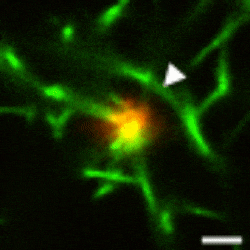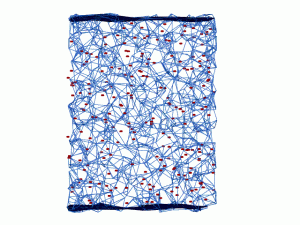
Email: ysun340@gatech.edu
EDUCATION
B.A., Mechanical Engineering, Georgia Institute of Technology, May 2016
PhD., Mechanical Engineering, Georgia Institute of Technology, May 2023 (expected)
RESEARCH
She joined the lab in 2014 though the Georgia Tech Undergraduate Research Program, where she developed interests in research. She received BS degree in Mechanical Engineering from Georgia Tech in 2016 and continued as a PhD student in Dr. Alexander Alexeev’s Complex Fluids Modeling & Simulation (CFMS) lab. Her current research focuses on the interdisciplinary area of complex fluids, biophysical mechanisms, and fluid-structure interactions.
 Her thesis project examines the complex Blood Clotting Process – behaviors and interactions between cells (platelets & red blood cells), matrix (fibrin scaffold), and blood flow inside blood vessel, using multiscale modeling techniques. She has also conducted projects to examine blood flow in stenosed arteries, ion transport in NCA lithium batteries, efficiency of plate-fin heat exchangers, and modeling of vapor-liquid mixtures, etc.
Her thesis project examines the complex Blood Clotting Process – behaviors and interactions between cells (platelets & red blood cells), matrix (fibrin scaffold), and blood flow inside blood vessel, using multiscale modeling techniques. She has also conducted projects to examine blood flow in stenosed arteries, ion transport in NCA lithium batteries, efficiency of plate-fin heat exchangers, and modeling of vapor-liquid mixtures, etc.
She is experienced in implementing a wide range of modeling and simulation techniques, including MD, FEM, LBM, analytical models, 3D modeling, to solve complex engineering problems. She is experienced in conducting data analysis, visualization, and presentation. She is experienced in conducting High Performance Computing. Noticing that machine learning can be a great compliment to multiscale modeling to create robust, scalable, predictive models. She is expecting to graduate in Spring 2023, and her future research interests revolve around fluid mechanics, advanced computational multiscale & multiphysics modeling, complex fluids and soft matter.
TEACHING
She has a passion to teach. Her goal as an educator is to positively influence students in various aspects: aiming to help students (1) be prepared for real world engineering practices, (2) build self-esteem to overcome future challenges, and (3) gain and maintain interest in exploring more about engineering. To achieve the goal, she follows three equally important principles:
- Be caring and enthusiastic while interacting with students.
- Purposefully guide students to develop intrinsic motivations for learning the subject.
- Provide personalized learning opportunities to students.
During her time at Georgia Tech, she has experiences in teaching:
- MATH 1501 – Calculus I
- Fall 2014: Undergraduate Teaching Assistant
- MATH 2552 – Differential Equation
- Spring 2015: Undergraduate Teaching Assistant
- Fall 2015: Undergraduate Teaching Assistant
- ME 3340 – Fluid Mechanics
- Spring 2017: Graduate Teaching Assistant
- Spring 2022: Instructor
- Summer 2022: Instructor (2 sections: in-person and virtual)
In additional to teaching classes, she provides mentorship for students by serving as:
- Qualifying Exam Study Group Organizer & Leader (6 semesters).
- Graduate Mentor (5 years) for high school, undergraduate, and early-stage graduate students.
LEADERSHIP
She is an active student leader and has a passion to serve the community. She joins various student organizations and departmental committees, working on improving the department environment of George W. Woodruff School of Mechanical Engineering – making it more active and more inclusive, not only among students but also between faculties and students.
- She is currently one of the Graduate Student Senators in the Georgia Tech Graduate Student Government Association.
- She has been serving as executive board member of MEGA (Mechanical Engineering Graduate Association) since 2017, and is currently serving as the president of MEGA.
- She is member of George W. Woodruff School of Mechanical Engineering Diversity, Equity, and Inclusion Council (DEI) since 2020-present.
- She is member of Woodruff School Graduate Student Development Committee (GSDC) since 2021-present.
- She has served in Mental Health Committee in 2020-2021.
She is experienced in designing and organizing a wide range of events (academic, professional, social) that benefits students in different ways. You can see a list of events she organized in 2021-2022 here.
In Fall 2022, she is working on the ME New Student Series (5 events), covering topics: (1) grad-school expectations, (2) designing grad-school timeline, (3) success as a women grad student, (4) keeping mental health in grad-school, (5) how to starting your research.
RESEARCH HIGHLIGHTS
- Platelet – Fibrin Contraction Mechanism

(click image to see animation: platelet contracting neighboring fibrin)
- Predictive Mesoscale Model for Fibrin-Platelet Clot Contraction
(click image to see animation: clot contraction between walls)
- Predictive Mesoscale Model For Blood Clot Contraction Under Flow
(click image to see animation: left – platelet extending filopodia; right – clot contraction)
New research shows platelets do their job better when not in total sync with one another

From left, researchers Wilbur Lam, Alexander Alexeev, and Yueyi Sun hope their findings open medical options for people with clotting issues.
Representative Publications
Sun Y, Myers DR, Nikolov SV, Oshinowo O, Baek J, Bowie SM, Lambert TP, Woods E, Sakurai Y, Lam WA, Alexeev A. Platelet heterogeneity enhances blood clot volumetric contraction: An example of asynchrono-mechanical amplification. Biomaterials. 2021 Jul;274:120828. doi: 10.1016/j.biomaterials.2021.120828.
Sun Y, Oshinowo O, Myers DR, Lam WA, Alexeev A. Resolving the missing link between single platelet force and clot contractile force. iScience, 2022 Jan; 25(1). doi.10.1016/j.isci.2021.103690.






